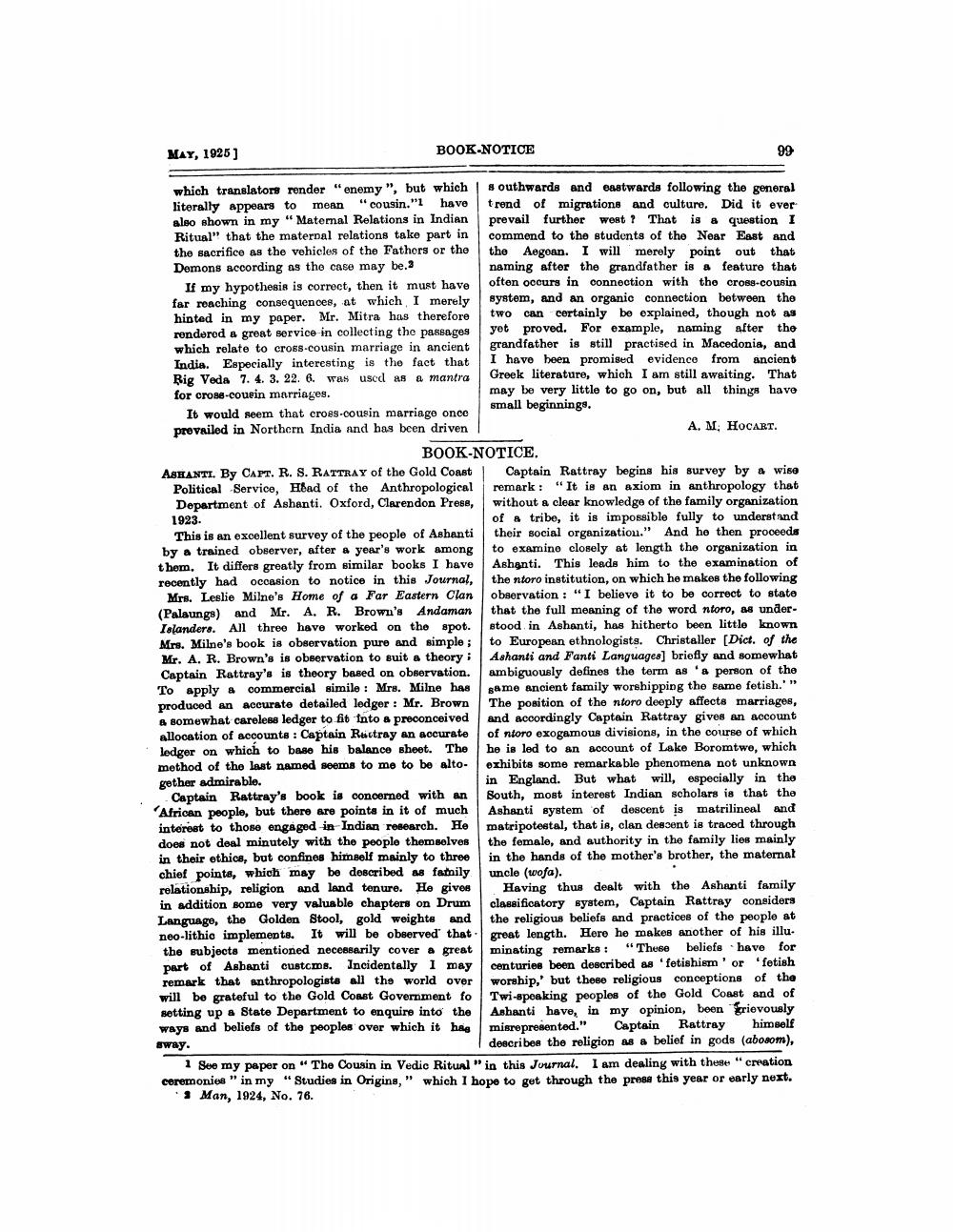________________
MAY, 1925)
BOOK-NOTICE
99
which translators ronder “enemy", but which southwards and eastwards following the general literally appears to mean "cousin."1 have trend of migrations and culture. Did it ever also shown in my “Matemal Relations in Indian prevail further went ? That is a question I Ritual" that the maternal relations take part in commend to the students of the Near East and the sacrifice as the vehicles of the Fathors or the the Aegean. I will merely point out that Demons according as the case may be.3
naming after the grandfather is a feature that If my hypothesis is correct, then it must have
often occurs in connection with the cross-cousin far reaching consequences, at which I merely system, and an organic connection between the hinted in my paper. Mr. Mitra has therefore two can certainly be explained, though not as rendered a great service in collecting the passages yet proved. For example, naming after the which relate to cross-cousin marriage in ancient
grandfather is still practised in Macedonia, and India. Especially interesting is the fact that
I have been promised evidence from ancient Rig Veda 7. 4. 3. 22. 6. was used as a mantra
Greek literature, which I am still awaiting. That for cross-cousin marriages.
may be very little to go on, but all things have It would seem that cross-cousin marriage once
small beginnings. prevailed in Northern India and has been driven
A. M. HOCART. BOOK-NOTICE. ASHANTI. By CAPT. R. S. RATTRAY of the Gold Coast Captain Rattray begins his survey by a wise Political Service, Head of the Anthropological remark: "It is an axiom in anthropology that
Department of Ashanti. Oxford, Clarendon Press, without a clear knowledge of the family organization 1923.
of tribe, it is impossible fully to understand This is an excellent survey of the people of Ashanti their social organization." And he then proceeds by a trained observer, after a year's work among to examine closely at length the organization in them. It differs greatly from similar books I have Ashanti. This leads him to the examination of recently had occasion to notice in this Journal, the ntoro institution, on which he makes the following
Mrs. Leslie Milne's Home of a Far Eastern Clan observation : "I believe it to be correct to state (Palsungs) and Mr. A. R. Brown's Andaman that the full meaning of the word ntoro, as underIolanders. All three have worked on the spot. stood in Ashanti, has hitherto been little known Mrs. Milne's book is observation pure and simple; to European ethnologists. Christaller [Dict. of the Mr. A. R. Brown's is observation to suit a theory: Ashanti and Fanti Languages) briefly and somewhat Captain Rattray's is theory based on observation. ambiguously defines the term as a person of the To apply a commercial simile : Mrs. Milne has game ancient family worshipping the same fetish.'” produced an accurate detailed ledger : Mr. Brown The position of the ntoro deeply affects marriages, & somewhat careless ledger to fit into a preconceived and accordingly Captain Rattray gives an account allocation of accounts : Captain Rattray an accurate of ntoro exogamous divisions, in the course of which ledger on which to base his balance sheet. The he is led to an account of Lake Boromtwe, which method of the last named seems to me to be alto- exhibits some remarkable phenomena not unknown gether admirable.
in England. But what will, especially in the Captain Rattray's book is concerned with an South, most interest Indian scholars is that the African people, but there are points in it of much Ashanti system of descent is matrilineal and interest to those engaged in Indian research. He matripotestal, that is, clan deszent is traced through does not deal minutely with the people themselves the female, and authority in the family lies mainly in their ethics, but confines himself mainly to three in the hands of the mother's brother, the maternal chief points, which may be described as family uncle (wofa). relationship, religion and land tenure. He gives Having thus dealt with the Ashanti family in addition some very valuable chapters on Drum classificatory system, Captain Rattray considers Language, the Golden Stool, gold weights and the religious beliefs and practices of the peoplo at neo-lithio implements. It will be observed that great length. Here he makes another of his illuthe subjects mentioned necessarily cover a great minating remarks: "Thule beliefs have for part of Ashanti customs. Incidentally I may centuries been described as 'fetishism' or 'fetish remark that anthropologiste all the world over worship, but these religious conceptions of the will be grateful to the Gold Coast Government fo Twi-speaking peoples of the Gold Coast and of setting up a State Department to enquire into the Ashanti have, in my opinion, been trievously ways and beliefs of the peoples over which it has misrepresented." Captain Rattray himself sway.
describes the religion as a belief in gods (abosom), 1 Sve my paper on The Cousin in Vedio Ritual "in this Journal. I am dealing with these creation ceremonies" in my "Studios in Origins," which I hope to get through the press this year or early next.
3 Man, 1924, No. 76.




